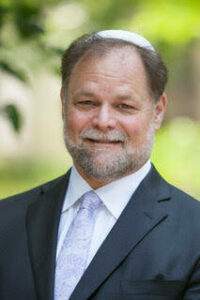 Rabbi David Levin
Rabbi David Levin
Parshat Mishpatim
“An Eye for an Eye will only make the whole world blind.”
Although attributed to Mahatma Gandhi, this understanding is the fundamental wisdom in this week’s Torah portion, Mishpatim.
The collection of civil and criminal laws found in Parshat Mishpatim serves as a moral compass for individuals and communities and influences how we interact with other societies. Two central ideas are the treatment of the stranger and the idea of an “Eye for an Eye.”
Treating the stranger with empathy and fairness is a core value because, as we are often reminded, we were once strangers. We know what it is like to be treated with suspicion and hostility, so we must act with kindness and understanding.
The second principle is that of “An Eye for an Eye,” known in Latin as Lex Talionis. The rabbis pushed back on the precise words of the Torah, notably in the Talmud, Bava Kamma 84, understanding the need to see it as symbolic. For if applied literally, we would, as Gandhi noted, all be blind.
Our reconsideration of how to apply the doctrine of Lex Talionis stresses that just societies require equitable justice and equal value for every individual. Everyone is equal in the eyes of the law and the eyes of God. This idea extends beyond us, including how we view others, societies and cultures.
Parshat Mishpatim teaches that ethical living and compassionate behavior are essential, although sometimes challenging. The detailed laws and regulations designed to cultivate a society based on justice, empathy and respect for others are timeless values. They can be applied to contemporary issues, guiding individuals and communities in creating a more just and compassionate world. To practice this in our current situation is most challenging and might require us to revisit and reframe another idea to say “enough” to the perpetual cycle of violence and revenge.
Rabbi Adin Steinsaltz notes the juxtaposition of Mishpatim’s laws immediately on the heels of Revelation at Sinai. This deliberate placement makes it clear that we are responsible for moving forward and controlling our destiny. Our current situation is another seminal post-Sinai moment.
The current war is part of an ongoing cycle of hatred and violence. It is Lex Talionis in its crudest form: tribal warfare where revenge and punishment are the ends unto themselves. It is time for us to rise and say, enough!
It is time for the truly brave to take courageous steps, building on a vision where two people might find a way to live side-by-side. Just as our tradition reimagined Lex Talionis, could we also reimagine, channeling our hostility and rightful rage into finally understanding that the old tribal blood libel ways will leave our children dead and the rest of us blind?
Through Mishpatim, we are entrusted with the power to establish and control our society. Our peace and security require looking beyond our borders and finding a way forward with our neighbors. The land we both claim belongs to us both.
Only when we realize we are inextricably bound together here can we look for a way forward and live together. This requires us to set aside preconceptions of our righteousness and the need to prevail over another. Instead, uniting in the righteous belief that all human life is sacred, we can be so much more together.
The path forward seems almost impossible. It has been said that the difference between the difficult and the impossible is that the impossible takes a little longer. Building trust in each other and having the courage to believe in the extraordinary potential of co-existence would be an astonishing break from the cycle that has defined the region for so long. These are hard and painful steps. And many are invested in preventing such a vision from ever being realized.
We must invest the time, energy and hope to make this our reality. In the immortal words of Theodore Herzl, “If you will it, it is no dream.“
Rabbi David Levin is the founding director of Jewish Relationships Initiative, a nonprofit focused on outreach and end-of-life challenges. He is also the interim rabbi at Temple Judea of Bucks County. The Board of Rabbis of Greater Philadelphia is proud to provide diverse perspectives on Torah commentary for the Jewish Exponent. The opinions expressed in this column are the author’s own and do not necessarily reflect the view of the Board of Rabbis.





